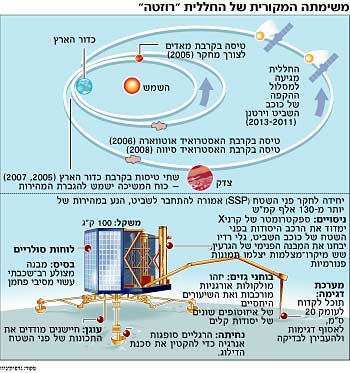The European space mission does not start * Preparations for landing a spacecraft on a comet lasted 8 years - and were canceled
Tamara Traubman, Haaretz (Wala!)

The original mission of the "Rosetta" spacecraft
About eight years ago, the European Space Agency (ESA) decided to start an ambitious project: to land the first spacecraft on a comet. The cost of the project was estimated at about one billion euros, and as part of it, the "Rosetta" spacecraft was supposed to go on a space journey that would last eight years. At the end of the journey, it will circle the comet "Viratnan" and land on it.
According to the plan, Rosetta was supposed to take off on Sunday this week, but a malfunction in one of the preliminary experiments postponed the launch. The Ariane-5 rocket designed to launch the spacecraft destroyed itself in a test conducted in December after it accidentally deviated from its trajectory.
Today the agency announced that the launch date has been postponed to another date, which will not allow Rosetta to land on Virtanen. This is because the preparations for the mission will not be completed until January 30 - the last date on which the routine can be given before it misses the comet, which will be outside its reach. Now the scientists will have to look for another comet to land on. Shifting the task to a new goal may increase its cost by millions of additional euros.
According to the investigation report conducted by "Arian-Space" - a commercial rocket launch service that will also operate the Ariane-5 launch, it is possible that the failure of the test in December was caused by a new component, which "will not be used in the standard format that will be used for the Rosetta launch." The European Space Agency stated that the search for alternative comets is still ongoing. About six possible comets are now being tested for landing. The choice of the final target, if necessary, will be made on the basis of the possible scientific benefit.
Scientists believe that comets are mainly composed of an icy mixture of rock and ice, but not much is known about them yet. Since the solar system was formed, about 4.6 billion years ago, comets have not changed significantly. Therefore, their composition reflects the early days of the solar system.
Scientists hope that the information collected by Rosetta will help to better understand the origin and development of the solar system, and will provide an answer to the question of how water got to Earth.
Rosetta is equipped with 11 scientific instruments, including instruments for photographing and analyzing dust samples from the orbit around the comet, as well as an instrument - which operates on radio waves - that will study the composition of the comet's nucleus. According to the plan, a lander that will leave the spacecraft will anchor itself on the surface of the comet and take its samples for the purpose of identifying its chemical composition.
